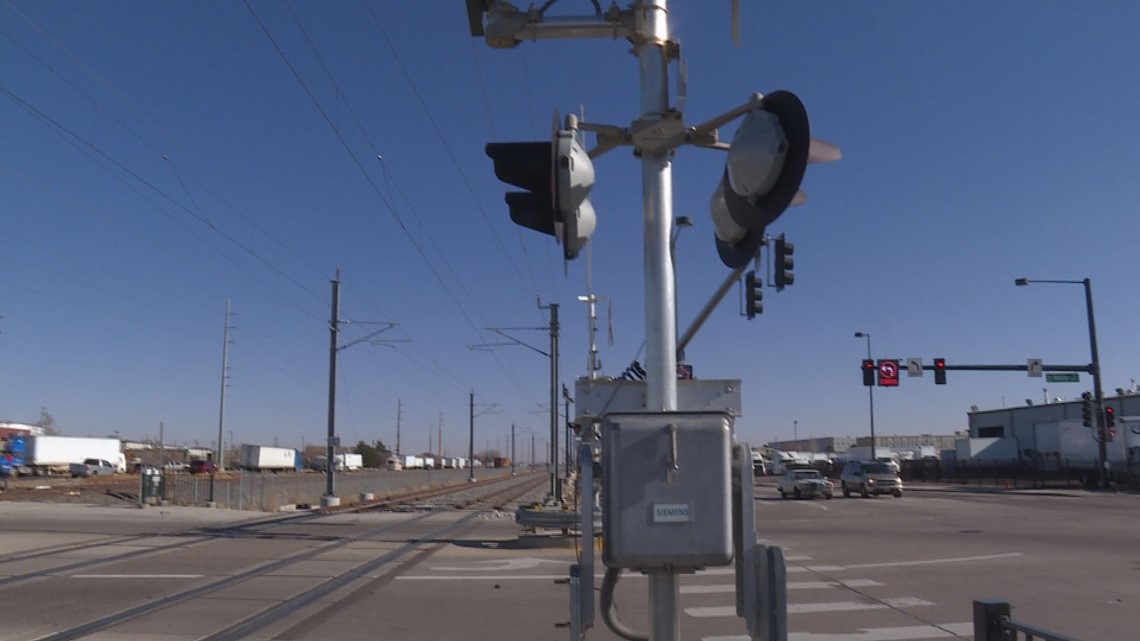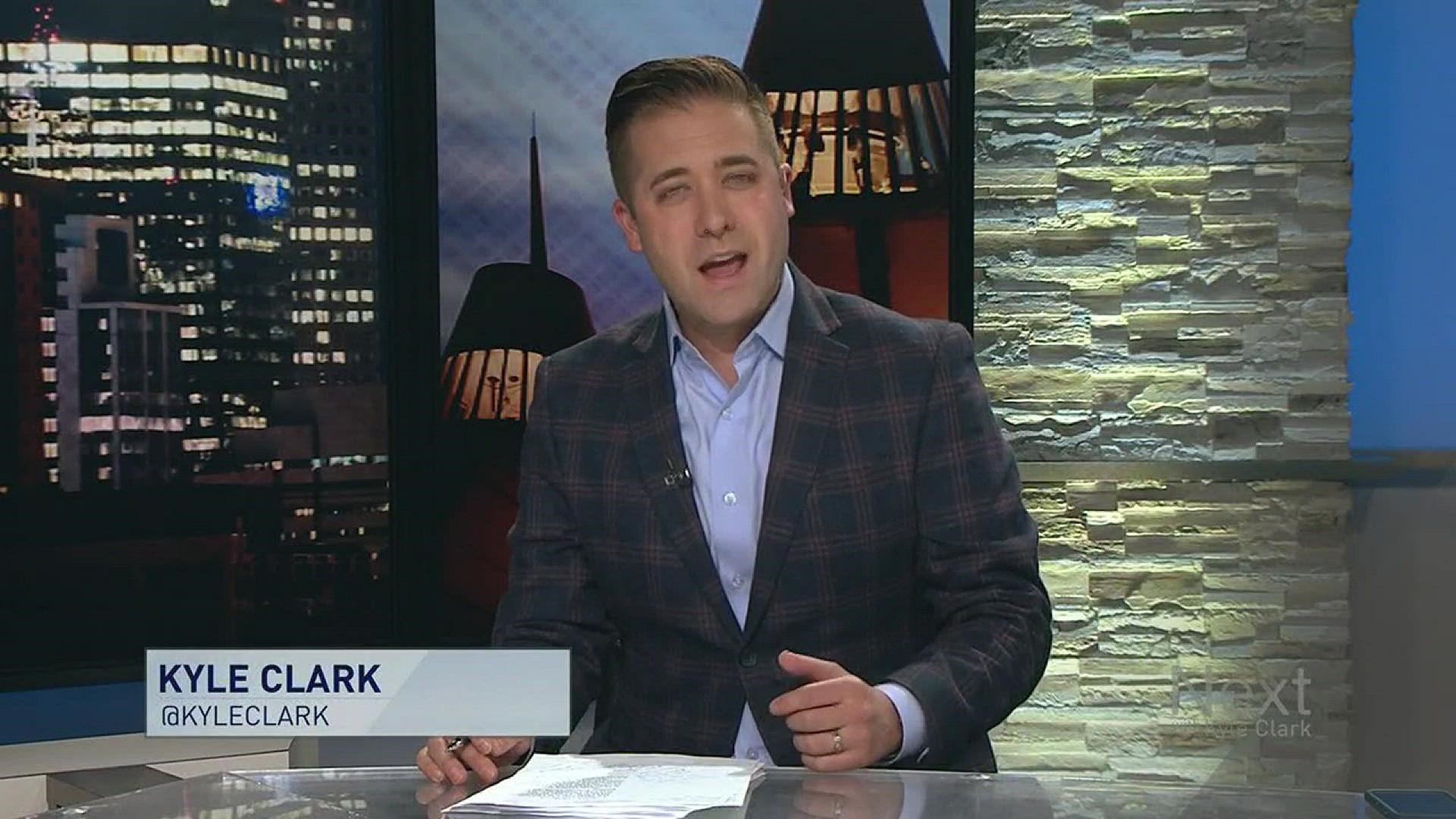DENVER — The Federal Railroad Administration has threatened to shut down Denver’s A Line because of what it calls “noncompliance” with national standards.
The FRA, in a letter dated Nov. 15, said the Regional Transportation District's failure to improve the timing of its crossing gates is “unacceptable" -- a complaint RTD has heard before. The letter was posted publicly on the FRA document database this week.
According to the letter, federal regulators visited Denver in August to examine the gates along the A Line - which runs from Union Station to the airport - and the B Line - which runs from Union Station to Westminster. Out of 540 tests, the gates didn’t meet standards 63 times. Inspectors found the Holly and Monaco crossings to be most problematic; the timing of the gates there didn’t meet standards in 20 to 30 percent of tests.
The timing of the crossing gates have been at issue since the A Line began operating in 2016. The FRA mandates various warning times for trains, and the A and B Lines didn’t meet the standard. The FRA said that RTD could begin running its new trains, though, if attendants manned the crossings.
In September 2017, when the FRA granted the A and B Lines a five-year waiver, it approved a “buffer time” for the trains. Warnings along the A and B Lines could occur up to five seconds early and the gates could stay down up to 15 seconds longer than necessary. That waiver also allowed for the removal of gate attendants, pending approval from the state regulatory agency. The Colorado Public Utilities Commission gave its blessing in March. Flaggers returned, however, to three A Line crossings and one B Line crossing in August because of continued concerns with the design of those particular gates.
RELATED | RTD request for flexible crossing times denied, rail lines will still need crossing guards


It’s not clear if RTD knew the FRA would be in Denver conducting the August tests, or why the FRA decided to run tests one year into the waiver. 9NEWS has asked RTD if the testing had anything to do with its previous request for quiet zones, so the train horns would stop blaring at each crossing. The FRA must approve that change, as well, but the letter says the agency can’t “justify granting this waiver request until RTD demonstrates compliance with the conditions of the waiver and other applicable Federal railroad safety regulations.”
The FRA notes they understand there have been issues with the way the warning system and the train’s operating system, the federally-mandated Positive Train Control, work together. But the agency also says that RTD has had more than two years to make progress, and RTD now must submit a new action plan detailing how it will move forward within 30 days of receiving the letter.
“This level of noncompliance with the conditions of the waiver is unacceptable,” the letter said. “If RTD fails to submit an acceptable action plan within 30 days of RTD's receipt of this letter, FRA will have no choice but to consider other actions as appropriate, potentially including enhanced enforcement, modification of the existing waiver—including by imposing additional conditions as necessary for rail safety and/or reducing the duration of the waiver—or revoking the waiver.”
The FRA also wrote that because of these concerns over crossing gates, it cannot allow the G Line, which will run from Denver to Arvada and Wheat Ridge, to begin operating. RTD expected the G Line to open in October 2016.
"First, I was told Fourth of July, then I was told Thanksgiving, then I was told by the holidays, I'm thinking best case is first quarter of 2019," said Arvada Mayor Marc Williams, about the train.
The federal inspectors also found that G Line crossings gates were outside their buffer time period 18 percent of the time.
"The reality of it is, the gates are coming down a little too long. It's not like the gates aren't coming down and trains are coming through. It's the opposite," said Williams. "In my conversations with Denver Transit Partners, they say the train is ready to open and that it's safe to open. They say that there's some cosmetic things that we can do to fine tune, but that we're not going to see dramatic changes in terms of the gate times."
Denver Transit Partners, the group responsible for building and operating the lines, received FRA’s letter, as well. DTP and RTD are currently involved in a legal battle over the work in question by the FRA, but RTD tells 9NEWS they’ll work with its counterpart to correct the issues.
And while RTD and DTP disagree on who’s to blame for the shortcomings, RTD and DTP agree the rail lines are safe to use.
"RTD’s commuter rail lines are reliable and safe. The A and B Lines have safely carried more than 17 million passengers over the past two-and-a-half years, and they have one of the nation’s best on-time performance rates of better than 97 percent. The same technology is built into the G Line and we expect that it will operate with similar efficiency and effectiveness once it is opened for service," said DTP project director John Thompson.
If all goes according to FRA’s plan, RTD will have a solution so that each train will comply with federal guidelines in one year. When asked if DTP could ever achieve the 20-second buffer at each crossing every time, as the FRA is requesting, Thompson said it is not clear.
"The system cannot guarantee precise warning times because train speed is controlled by the human operator and is subject to conditions occurring between the time signals are activated and trains arrive at crossings. The Denver system experiences equal or greater consistency than other railroads that have been studied," said Thompson.
“RTD had previously notified DTP of regulatory deficiencies and required that DTP provide the transit agency with a remedial plan due to DTP’s failure to satisfy regulatory and contractual requirements in a timely manner,” their statement said. “This update does not affect the continued safe, reliable service of the University of Colorado A Line...."
The A, B and G Lines were the first trains in the country to begin running with these gate-control and operating systems.

